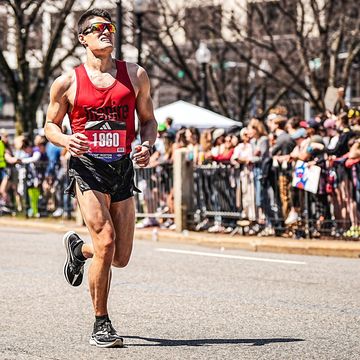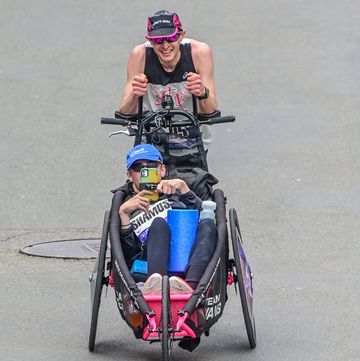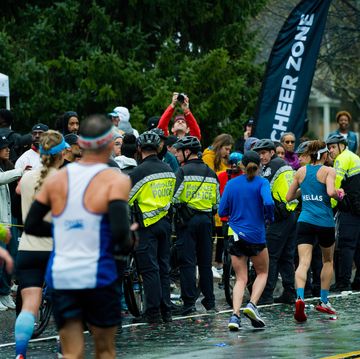There I was, fresh off a 7-hour flight from Chicago to London—sleeping on a bench in front of the Tower Bridge. Although my husband, parents, and I immediately sipped on caffeine-potent espressos as soon as we landed, the exhaustion took hold and I couldn’t fight the zzz’s. It was days before any of us felt as if we had a “normal” sleeping schedule, and after we returned home, the jet lag seemed to last for weeks.
Jet lag can be challenging, even crippling, to many travelers. The American Sleep Association reports that although no one is immune from jet lag, women are at a higher risk of experiencing this travel inconvenience.
RELATED: 11 Tips to Beat Travel Fatigue When Flying For a Race
We asked three health experts to share their top jet lag-busting methods to use before, during, and after your trip so you can turn the friendly skies into the friendly and restful skies. With these words of wisdom, perhaps I won’t find myself sleeping the day away on a public bench ever again, and you, too, can enjoy your travels to the fullest.
Before you travel
Before you travel, there are several things you can do to head off jet lag at the pass. Jesse Lane Lee, holistic nutritionist, author, media personality, and founder of Jesse Lane Wellness, recommends shifting your sleep schedule to adjust to the new time zone a few weeks before your trip. “Slowly shifting your bedtime will mean that the new time zone won’t be so dramatic, and it will reduce jet lag,” says Lane Lee.
Neda Varbanova, certified health coach and founder of Healthy with Nedi, plans ahead before she departs so she can continue her healthy routines, even away from home. “Before I leave for a trip, I make sure to get in a good workout and drink lots of water. If I am staying in a hotel, I call ahead to book a personal trainer and a massage so that I can get straight into my routine as soon as I land,” says Varbanova.
Dr. Cassie Wilder, NMD, a naturopathic doctor, has some specific techniques to combat jet lag depending on the direction you’re traveling in.
When traveling west, Wilder says, “Say you’re going from London to New York City. You’re gaining time, which means it will be brighter here than it will be at home. You’ll want your body to readjust to the sleep schedule of New York and delay melatonin release. For three days before your trip, you’ll want to stay up later, but don’t just lounge in your dark living room watching television. Keep all the lights on and do activities that keep you awake, like walking. You’re ‘training your brain’ to adjust to the need to delay the release of melatonin. Training your brain to delay-release melatonin is no easy task, and can be one of the biggest contributing factors to jet lag.”
RELATED: 4 Ways to Find Out How Much Sleep You Really Need
Wilder adds, “If you’re traveling east, say Los Angeles to New York City, you will want to do the opposite—you’ll want to train your brain to secrete melatonin earlier than it’s used to. So, shut all the curtains, turn off the lights, stop looking at your computer and cell phone, and take between 1 to 3 mg of melatonin three to four hours before you normally go to bed. Allow your body to feel sleepy. An added bonus is to set your alarm clock three to four hours earlier than you’re used to and turn on all the lights, stimulating sunrise and daytime.”
During your flight
When you fly to a far-off destination, you cross many time zones all at once, something that can be confusing to the body. That’s why our experts recommend that you keep the timetable of your destination in mind while you’re in the air. “Bring things like an eye mask, ear plugs, and comfort items, such as a pillow and blanket, to give yourself the best scenario to get quality sleep,” says Wilder.
Soothing meditation can also lead to restful sleep on the plane. Varbanova specifically suggests the Calm app, saying that a 15-minute meditation always helps her relax.
Watch: Perform these six postrace recovery moves on your next flight.
When you’re not drifting off to dreamland, try to keep the “waking hours” of your destination. Wilder advises getting up and walking around when you’re awake. “Stay active and eat when you’re supposed to be eating,” she says. “Meaning, when it’s breakfast time at your destination, eat something that will nourish you and keep your blood sugars stabilized so you can feel full longer. Dietary proteins and fats are best at doing this.”
RELATED: How to Keep Up Your Healthy Routine While Traveling
And there’s something else you should be doing while you’re awake—drinking water.
Lane Lee says, “Before flying and during your flight, it is really important to stay hydrated. Flying is extremely dehydrating, and dehydration leads to feeling tired. Drink lots of water and stay away from coffee and alcohol, which are both dehydrating. Aim to drink 500 ml [or roughly half a cup] of water for every hour in the air. Drinking lots of water means you will be getting up to use the bathroom more often, but that movement is great because it will keep your blood circulating.”
On your trip
As soon as the plane touches the ground, the effects of jet lag can start setting in. Whether you’re traveling for business or pleasure, you’ll likely want to make the most of your trip, and there are ways to ease jet lag so you can do just that.
Varbanova says, “Even if I am tired, I find it best to jump into the day instead of laying around the room. The faster you get used to the new time zone, the better. Going for a walk in the park or a workout in the gym will wake you up and help you get ahead with your day.”
Lane Lee agrees. “Personally, I find trying to adjust to the new time change right away really helps. If that means I’m awake for 20 hours after I land, so be it!” She adds, “If I can spend the first day outside, the sunshine really helps reset my internal clock.”
RELATED: Travel-Friendly Luggage Runners Will Love
Wilder says it can help to schedule your first day’s events ahead of time. “Make sure you plan out what the day will look like when you get to your destination. Set your watch to the time zone you will be landing in and figure out what kind of activities you will be doing,” says Wilder.
Sunlight and fresh air can be a powerful prescription for jet lag. “Focus on having fun and not the time zone you just left. If it is daylight when you land, pick outdoor activities to do such as a walking tour of the city or a hike. It can be tempting to take a quick nap when you land, but pushing yourself to acclimate immediately after you get off the plane will get you the best results,” says Wilder.
Meals can also be tricky if you’re in a new time zone, but Wilder says that “even if you are not hungry at lunch time, make a point, especially during the first few days, to eat on schedule.”
During the day, you might be exhausted. Then at night, there’s a chance you’ll be wide awake and find it impossible to fall asleep. In this case, Lane Lee recommends melatonin. “Melatonin is a great supplement that helps promote sleep and reset the body’s clock. I recommend taking it at bedtime in the new time zone to make sure you fall asleep at a reasonable hour and wake up feeling refreshed in the morning,” says Lee Lane, adding that an Epsom salt bath with a few drops of lavender essential oil is a “great way to calm the nervous system and prepare the body for sleep.”
Finding the right circadian rhythm can even be as simple as choosing the ideal lighting in your hotel room.
Varbanova says, “I find that adjusting the light to match your desired time zone helps your body adjust faster. If you’re trying to keep yourself awake, brighten the lights, and if you want to get some serious sleep, use black-out curtains or an eye mask.”
RELATED: 6 Travel-Friendly Moves to Boost Your Recovery
Returning home
Even though your trip might be over, jet lag has a sneaky way of following you home. If you’ve done all the aforementioned tricks, it will likely be much easier to assimilate back into your daily life. But if you still find jet lag creeping up in those first few days, there are steps you can take to lift it.
Lane Lee says that the techniques you used before and during travel can still work when you’ve returned home. Your body will be able to bounce back more quickly if you stick to eating healthy, whole foods, says Lane Lee. “Including cherries in your diet is great because they contain melatonin, making them a great food to eat if you are having trouble sleeping,” she says.
Varbanova recommends a proactive approach to diminishing the effects of jet lag.
“Depending on where you are coming from, you will either want to hit the pillows super early or stay up late,” she says. “Try not to fall asleep at 7 p.m., but rather book a dinner with some friends and go out. If it is the other way around and you find yourself up late at night, take a bubble bath while reading a relaxing novel. Then meditate in bed, and you will fall asleep before the meditation is over. This works for me like a charm.”
Wilder says that it’s essential to “jump back into your daily routine,” saying, “Much like you powered through the first couple days of travel, you have to acclimate your body to home day and night cycles.”
If you have a history of experiencing jet lag and anticipate that it still might continue to hang on long after you’ve landed, Wilder proposes building in a buffer before you head back to work. “Take an extra day or two off work to give yourself time to catch up on sleep and adjust back to your home sleep/wake cycle,” says Wilder.
Those couple days will allow you to enjoy the comfort of your own bed, something that will undoubtedly help you alleviate jet lag and get back into the groove.
* * *
The article The Best Ways to Avoid Jet Lag When You Travel Across Time Zones originally appeared on Rodale’s Organic Life.













